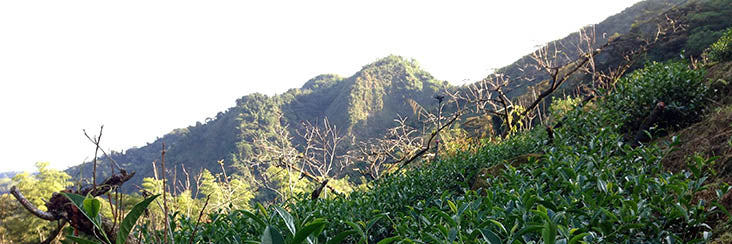
Back to the farm: A historical event in the heart of oolong country
At the ripe young age of 60, with over 30 years of extensive experience in the industry, a tea farmer in Lugu Taiwan is returning to his roots and going small-scale organic.
This project is the culmination of 20 years of exploring Taiwan tea. Our recent connection with Mr. Lin, however, is what has brought this campaign into being. Eco-Cha was initially conceived to support sustainability in the local tea industry. We soon realized that the traditional industry that predated large-scale tea production is synonymous with sustainable practice – particularly now that responsible farming practices have been recovered and innovated. We see Mr. Lin’s current work in growing organic tea on his repurposed family land and building a refurbished factory in his home for organic tea production as a prototype of our mission.

We met Mr. Lin at a pivotal point in his career. He has been through a lot in the last 20 years or so, and now he is aligning his personal values with his professional skills and resources to do the right thing.
He started learning the tea trade as a teenager in his hometown, which happens to be the source of Taiwan’s historical Dong Ding Oolong Tea. The demand for this tea went beyond the limits of local production and spurred the development of remote, large-scale tea production in the form of High Mountain Tea – Taiwan’s new age oolong. Mr. Lin followed this lucrative trend and developed a large, high-elevation farm far away from his home. Due to factors that he could neither control nor agree with, he left this level of industry behind after 15 years of work in developing a tea farm.

He came back to his family land and cleared a virgin plot of bamboo forest to plant Qing Xin Oolong in an undeveloped corner of Lugu Township. For some unknown reason, the crop failed. He then decided to grow persimmons. This worked well, until a spike in the local monkey population made it a losing battle. Mr. Lin has been a vegetarian for 40 years and has no interest in harming animals, so he surrendered to the monkeys and let go of his persimmon crop. He then worked as a manager of tea production in various capacities in Taiwan and China. In the process, he reconnected with a grade-school classmate who developed Taiwan’s first ecological high elevation organic oolong tea farm. After processing tea at this farm for several seasons (which is where we met Mr. Lin) he was convinced that this is the new horizon. Here is the view from his farm:
Two years ago, he planted a crop of a new hybrid oolong, Tai Cha # 20. This plant is a recent development by the Tea Research Extension Station to be more resistant to natural pests and suitable to the climate/elevation of his land. We had a chance to procure some of the earliest production of this new hybrid a few years ago, and have been searching for a steady source ever since. It has a unique fragrance and character of flavor that somehow embodies a traditional oolong – perhaps akin to Tie Guan Yin. We have high hopes for the future production of this strain.
We were there and documented the organic inspection in early September. We have continued to compile this story and will produce a full video documentary of this exemplary case study. To our knowledge, no other farm in Lugu is certified by the same organization. Also, there is no other certified organic tea factory in the area. This small traditional style factory will be available for other local tea farmers to make use of in the production of their certified organic tea. Mr. Lin is breaking ground in the local industry in this respect, and we are backing him with all we've got.





